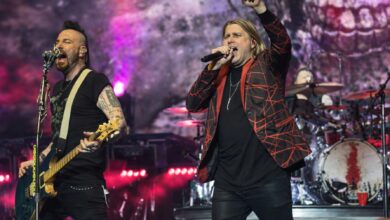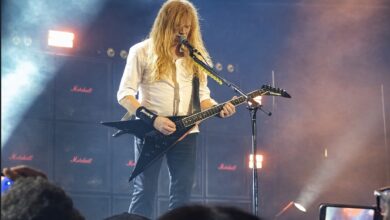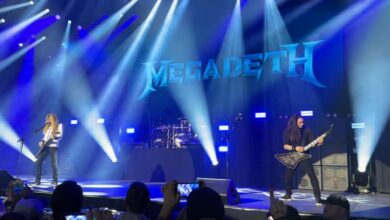Royal Rhapsody: HM Royal Marines Turn Queen’s Masterpiece into a Marching Epic
At the Mountbatten Festival of Music in March 2025, the Massed Bands of His Majesty’s Royal Marines strode onto the Royal Albert Hall stage to do something audacious: translate Queen’s seven-minute rock-opera roller-coaster into the language of brass, woodwind, and military precision. The hall was packed to its ornate rafters, and the Corps of Drums stood ready like a line of crimson-tipped exclamation marks, perfectly aware that every nuance of Freddie Mercury’s magnum opus was about to be judged by thousands of devoted fans.
Long before that opening chord sounded, the Marines had cultivated a worldwide reputation for bending genres without breaking discipline. In past seasons they’d peppered their programs with film themes, big-band swing, and even a symphonic take on Iron Maiden. Tackling “Bohemian Rhapsody,” though, meant honoring a song famous for its majestic excess while keeping the crisp, unmistakable bite of a military ensemble. To get there, Band Colour Sergeant Nick West spent months dissecting Queen’s multilayered tapestries and re-assigning each vocal harmony to flugelhorns, clarinets, and euphoniums.
Rehearsals began in Portsmouth’s cavernous drill halls, where the band practices between naval duties. Musicians joked that they had to swap their usual parade steps for head-banging footwork just to feel the song’s swing. Those good-natured laughs hid relentless wood-shedding: percussionists perfected gong swells to mimic Brian May’s feedback, trumpet sections learned to phrase like rock guitarists, and the choir-like “Galileo” runs were drilled until every sixteenth-note burst lined up as neatly as buttons on a dress tunic.
When performance night arrived, conductor Lieutenant Colonel Jason Burcham used a single downbeat to launch the famous intro. Woodwinds carried the quiet piano figure, their velvety tone creating the illusion of Mercury’s lone voice against the darkened hall. The effect was cinematic: stage lights dimmed to a moonlit glow, and the audience leaned so far forward you could almost hear the collective breath draw—in that hush, the hush itself became part of the arrangement.
As the ballad section unfolded, the Marines let Queen’s melancholic storytelling breathe. French horns supplied a mellow counter-melody while a lone solo cornet traced Mercury’s plaintive vocal line. To maintain the song’s pop-rock integrity, the rhythm section employed a hybrid kit: timpani for thunder, a lightly damped snare for heartbeat pulses, and a vibraphone shimmering in the background like studio echo. Every bar merged symphonic color with rock intimacy.
Then came the operatic surge—usually the point where even tribute bands stumble—but the Royal Marines turned potential chaos into choreographed drama. Two dozen voices from the Royal Marines Choir lofted the famous “Scaramouche” call, answered by trombone fanfares that raised the hall’s domed ceiling another imaginary meter. Lighting techs splashed crimson and sapphire hues in perfect sync, and the Corps of Drums punctuated every mock-operatic staccato with rifle-straight stick flips.
The heavy-rock breakdown arrived like cannon fire. Whereas May’s original solo roars from an overdriven Red Special, the Marines unleashed a triple-trumpet frontline doubled by electric guitar—one of the rare times the festival allows a six-string onstage. Its player, a Royal Marine Musician who moonlights in a prog-metal band, burned through the fretwork while bassoons and baritone saxophones hammered the low-end gallop. The military backdrop made the riff feel gladiatorial rather than merely rebellious.
Audience reactions were instantaneous and loud: gasps during the operatic fireworks, whoops at every power chord, and an audible, collective gulp when the ensemble executed a razor-sharp silence before the final “nothing really matters” reprise. Many spectators later recalled that the pause felt longer than it was—a heartbeat stretching to eternity—before the gentle woodwind coda floated down like a lullaby after battle.
This wasn’t the first time the Royal Marines flirted with Queen. Back in 2019 they spliced “Don’t Stop Me Now” into a brass-band mash-up, and a 2022 set featured “Somebody to Love” with gospel-choir gusto. Each experiment sharpened their understanding of Queen’s harmonic daring, teaching arrangers how to mirror stacked vocals with layered instrumentation and how to let rock energy breathe inside ceremonial correctness.
The band’s willingness to tackle pop and rock classics traces to their post-WWII mission of cultural diplomacy. Touring the world, they discovered that contemporary hits often opened doors faster than marches alone. Queen’s catalogue, already steeped in theatricality, proved perfect for demonstrating that military musicians aren’t locked in century-old repertoire but are storytellers fluent in whichever idiom best thrills a crowd.
Behind that showmanship lies military-grade training. Every Royal Marines Musician completes the physically demanding Commando Course before embarking on two-plus years of conservatoire-level study at the Royal Marines School of Music in Portsmouth. By the time they confront something as fiendish as “Bohemian Rhapsody,” they have already mastered Bach fugues, contemporary jazz charts, and cross-country yomps with a fifty-pound pack—making Mercury’s key changes seem tame by comparison.
Adding extra poignancy in 2025, eleven Ukrainian military musicians joined the stage as special guests. Their presence turned the operatic section into a cross-cultural chorus, symbolizing unity through shared musical language. Listeners described goosebumps when the combined brass lifted the climactic high-B-flat, a moment that felt less like a single note and more like an audible handshake between allied services.
Charitable purpose also underscored the evening. Proceeds from the Mountbatten Festival traditionally support the Royal Marines Charity and aid service members transitioning to civilian life. This year’s “Bohemian Rhapsody” headliner attracted additional donations, boosted by online viewers who, within hours, pushed the performance past half-a-million streams. The fusion of entertainment and philanthropy affirmed the Corps’ motto: “Per Mare Per Terram—By Sea, By Land—and, increasingly, by song.”
Social media lit up in the aftermath. Clip compilations on TikTok juxtaposed the Marines’ crisp salutes with close-ups of cymbal-choked crescendos, garnering millions of loops. Queen die-hards on Reddit ranked the arrangement alongside the London Symphony Orchestra’s 1979 reading and Metallica’s S&M hybrid, praising the Marines for delivering the rare cover that respects every bar yet still injects fresh adrenaline.
Even Brian May took notice. In a short congratulatory message shared on X, he commended the “precision and passion” of the Marines and joked that he’d happily exchange his trademark curls for one of their white-pith helmets—at least for an encore. The tweet sparked another viral ripple, drawing crossover fans who might never have attended a military concert into the fold.
By the final notes, as the players stood at attention, the energy in Royal Albert Hall felt strangely intimate. A song birthed in the flamboyant chaos of 1970s rock had, in that moment, become a statement about craftsmanship, unity, and the enduring power of music to transcend uniform, genre, and generation. The applause lasted long enough to blur the line between concert and ceremony.
When the last echo faded, ushers—some of whom have worked the Mountbatten Festival for decades—agreed they had rarely seen such all-ages elation: toddlers in miniature sailor caps, teens discovering Queen for the first time, and veterans who marched to different tunes altogether, all roaring in unison. The Marines, ever disciplined, offered a crisp salute before filing offstage, leaving only the lingering reverberations of a rock epic reborn in brass.
The performance reaffirmed why “Bohemian Rhapsody” endures: its structural audacity invites fresh interpretation, while its emotional arc speaks to universal hopes and fears. In the hands of the Royal Marines, it evolved yet again—stripped of Freddie’s falsetto but clad in ceremonial whites, reminding listeners that reinvention is a duty, not a luxury, when preserving cultural treasures for future ears.
Finally, as the audience spilled into the London night, many caught themselves humming fragments—the whispered “Galileo,” the triumphant guitar motif—realizing those notes now carried the crisp echo of snare drums and the disciplined heartbeat of a military ensemble. Somewhere between rock concert and state occasion, the Band Service found a new way to make an old masterpiece march proudly into tomorrow.





